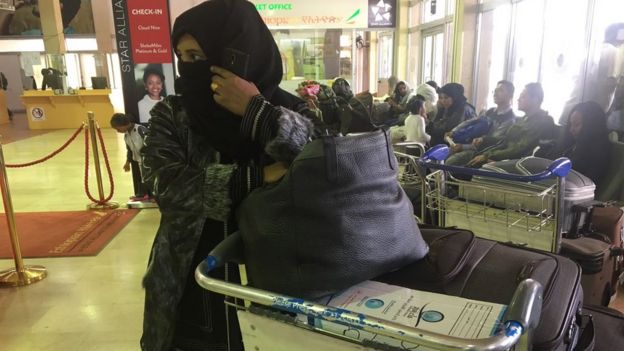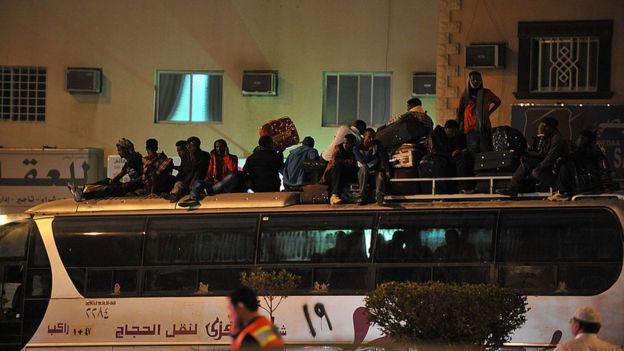Addisstandard
Samuel Bogale
![]()
Dagmawi Melnilik Hospital, which was later upgraded to a referral hospital, is the nation’s first hospital built in 1909
Addis Abeba, July 25/2017 – “You have to apologize to the health professionals as we believe that you disrespected the professionals and the improvements made in the health sector,” reads a letter written in Amharic on 3 July, 2017, and was sent to the national broadcaster, Ethiopian Broadcasting Service (EBS). The letter was written by the Ethiopian Medical Association (EMA) in response to a segment aired on EBS by a talk show host who took the liberty to “disparage the professional integrity of medical practitioners” in hospitals in Addis Abeba.
On his Sunday night show, aired on 21 May, 2017, talk show host Seifu Fantahun talked about recent trends by medical doctors in Ethiopia who “simply refer” their patients to go abroad for better treatments when they can provide one at home; he went on asserting that many patients don’t believe what a single doctor tells them, a remark which troubled the management at EMA.
A doctor for 17, 000 Ethiopians
In the letter it sent to the broadcaster, EMA admits that a small number of doctors do tend to resort to the practice of referring patients abroad, but it attempts to draw the public’s attention to the bigger picture that has besieged the medical sector in the country: the ever widening gap of doctor to patient ratio which is leaving, in many instances, “health centers with only one doctor as a result”, according to one pediatrician, and the poor state of medical infrastructure in mostly state-run hospitals, which is crippling the already scarce number of medical professionals.
The number of doctors in general and the doctor to patient ratio in Ethiopia has always been a topic of debate and differs from one source to the other. The government often prides itself for the significant improvement it registered mainly in rural health sector, but an annual report provided to Addis Standardby the Ministry of Health reveals that currently there are just 411 government health care centers with only 5,540 doctors who are thinly spread throughout the country. With a figure like that, the doctor to patient ratio stands at one to 17,000 people, a slight improvement from the 2014 ratio of one to 20,000.
A statistical analysis published on World Atlas on 25 Jan, 2016 also shows that Ethiopia ranks 4th among the 25 countries with a very limited access to health care. According to this report, Ethiopia has only 22 doctors for a million people, a big difference even by the standards of other African countries, which are not synonymous with “fastest growing economics,” such as Somalia 35, Guinea-Bissau 45, Burkina Faso 47 and the war-torn Central African Republic 50. Of all the 25 countries with the least access to health care, 24 of them are found in Africa. Sadly, anywhere from 25% to up to 50% of African born doctors (including many from Ethiopia) are working overseas, starving these countries of badly needed medical professionals whose expensive training is often paid for by public finances. That said, many medical professionals remain in their home countries, including in Ethiopia, despite daunting everyday challenges that perhaps even their Hippocratic Oath didn’t prepare them for.
EMA, the only association of its kind in a country of about 100 million people, told Addis Standard that there were only around 2,000 Ethiopian and a few foreign doctors who are currently the members of the association; it estimates that currently there are just about 600 specialists throughout the country.
Highlighting on the issue of shortage of medical professionals in Ethiopia, a practicing pediatrician at the Tikur Anbesa (Black Lion) Hospital, the nation’s biggest referral hospital, and a member of EMA, told Addis Standard that currently there were only about 200 radiologists, 300 pediatricians and 60 psychiatrists in Ethiopia. “It is easy to see how overwhelming this is.”
Addis Abeba’s severe burden
The situation in many state-run hospitals outside of the capital is no less grim, but the burden is severe when it comes to the nation’s capital Addis Abeba, where the majority of Ethiopians from all over the country get referred to for “difficult recovery” including cases of emergency and serious illness that cannot be treated at health centers in regional capitals, cities, towns and even Woredas (small administrative unit) labels.
![AddisGazetta]()
At Felege Hiwot Hospital, in Bahir Dar, the capital of the Amhara Regional State, patients crowd a corridor waiting for a doctor
In January 2014, Addis Standard published a story on the alarming state of government hospitals in Addis Abeba, where “simple medical equipment such as glucometer strip, disposable gloves, mask, and alcohol are always in short supply even in the emergency section.”
A few changes have been made between now and then. In the state-owned Tikur Anbessa Hospital, for example, “a new CT scan and MRI building [have been] built [since then] with machines of the latest technology. It has had a tremendous impact; [and] an eight floor emergency department building expansion is nearing completion. We are expecting cardiac transplantation together with catheterization labs,” said the pediatrician who wants to remain anonymous.
For all the improvements however, Tekur Anbessa Hospital is chocking with an estimated 3, 000 patients seeking treatment at any given day. And in Zewuditu Memorial Hospital, another state-owned hospital, 128,998 patients were admitted in the last 12 months only, seeking medical care from just 59 doctors and 286 nurses who are working in the hospital currently.
A random visit to most of the 12 state-owned hospitals in Addis Abeba presents one with some of the worst experiences a patient in a dire situation could ever go through. Poorly maintained corridors often overflow with patients seeking treatment for illnesses including contagious ones is a common site. Most of these patients do wait for their turn queuing for hours just to get a single doctor to attend to their needs; some even contract additional diseases.
![Dagmawi Menilik new]()
The new premises of the oldest state-run Hospital, Dagmawi Menilik Referral Hospital
An “educated guess”
Our pediatrician interviewee at Tekur Anbessa Hospital believes that Ethiopian physicians are competent in their “clinical knowledge and diagnostic abilities”, but adding fuel to the multi-faceted challenge they face is the inconsiderate misunderstanding of these challenges often reflected within the society at large and the media in particular.
“Although I admit few unethical professionals abuse patients for their benefits, 99% of physicians face the unfortunate criticism that one per cent of their colleagues deserve,” he said when commenting about the letter of complaint from EMA to the national broadcaster, EBS.
Mentioning the experience he had as a general practitioner in a rural hospital, he describes cases of over-simplified complaints as worse in urban areas. He has been a medical practitioner in rural Ethiopia but “once I returned to [Addis Abeba] city, as each year passes, I am becoming bitter at the lack of understanding the public I serve shows.”
It is true that a “patient requires a competent doctor, adequate medical tools and laboratory services as well as competent hospital and health administration,” he concurs, “and at the end of the day, after all is said and done, the patient needs medications in adequate supply;” but the question of ‘who is responsible for these needs to consider the different dynamics challenging the sector needs to be seen thoroughly. “Competency in his or her profession is obviously the physician’s and the education system’s responsibility. [But] providing medical tools and laboratory services [in state-run hospitals] is the government’s responsibility.” The public is simply looking for someone to blame whenever the course of an illness goes awry, he says, but evaluating the success and failure of the practice cannot simply be based on an “educated guess.”
State vs private hospitals
Privately owned hospitals in the country are known to provide better services than state-run hospitals; they can afford to overcome financial and management hurdles to make sure that they are equipped with better facilities than those run by the government. “All advanced medical treatments over the past two or three decades were first introduced by the private sector,” says our interviewee. Describing his own experience of practicing at private hospitals, he says he often comes across with “medications I only read about in books and never thought were at my disposal to treat my patients.”
But private hospitals are also known for their prohibitive costs, making their services unavailable to the good majority of Ethiopians. “There were times that doctors at government hospitals raise money to pay for the treatment of their patients in private hospitals.” But questions linger. “Can the fact that better health services are seen in the public sector be really attributed to the government having less money than the private sector?”
Be that as it may, the culture of oversimplified blame means private health centers, too, are not spared as they are often targeted as simply “greedy or over-priced merchants”. The paradox that leaves medical practitioners such as our interviewee (who also works a double shift at a private hospital to have ends met) is that the same people who are willing to pay for the price hike of goods that are not [terribly] relevant with little objection – think of “a slab of fatty meat that clogs up your arteries” – are the same people who often complain heavily when it is for the consultation of physicians and treatments at private hospitals. “My patients at private hospitals pay 100 Birr to consult me [that is] a US$4.50.”
![Help for medical care]()
Hanna Atilaw, a young girl seeking for financial help for a treatment abroad, uses a tax in Addis Abeba to appeal for help
But what is lost in this is that the people who pay the real price for the country’s ailing state of health care in state-run hospitals are the ones who have neither the means to afford for their medical cares, nor the channel to air their grievances.
The streets of Addis Abeba are quite familiar with patients who are left with no means but to beg for money to cover their medical expenses either in private hospitals or abroad; the treatments they need are simply unavailable in the cheaper state-run hospitals where they can afford to pay. AS
The post The ailing state of health care in Ethiopia’s state-run hospitals: who takes the blame? appeared first on Satenaw: Ethiopian News|Breaking News: Your right to know!.
























